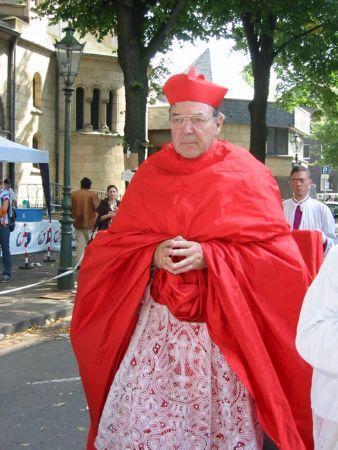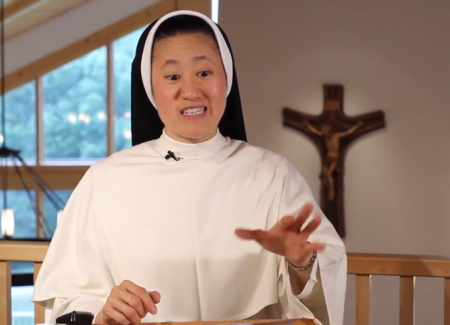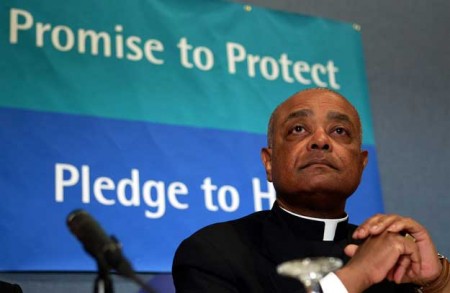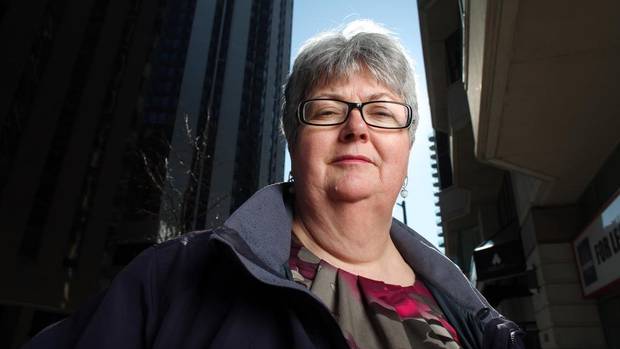BY THOMAS ORITI
Australia’s most senior Catholic cleric, Cardinal George Pell, has told an inquiry into child sexual abuse he should have exercised greater oversight in the case of a victim who sued the Church.
 The hearing room at the Royal Commission into Institutional Responses to Child Sexual Abuse in Sydney is packed to capacity as Cardinal Pell gives his highly anticipated testimony.
The hearing room at the Royal Commission into Institutional Responses to Child Sexual Abuse in Sydney is packed to capacity as Cardinal Pell gives his highly anticipated testimony.
It comes after two weeks of evidence from Catholic Church officials who have recalled their involvement in the case of John Ellis, who was abused by Sydney priest Father Aidan Duggan in the 1970s.
There are conflicting accounts of what Cardinal Pell, the former archbishop of Sydney, knew about the case when Mr Ellis sued the Church.
Mr Ellis lost his case in 2007, when the New South Wales Court of Appeal ruled the Church was not a legal entity that could be sued – the so-called Ellis defence.
Last week Cardinal Pell’s private secretary, Dr Michael Casey, told the commission the Church’s vigorous cross-examination of Mr Ellis during the litigation process was wrong.
Dr Casey last Thursday faced hours of intense questioning about the Church’s handling of Mr Ellis’s claim during which he said Cardinal Pell had directed the legal team to be aggressive in its cross-examination.
The commission has also been told Cardinal Pell took months to stop pursuing court costs.
In a statement tendered to the royal commission this morning, Cardinal Pell says the “legal battle was hard fought, perhaps too well fought by our legal representatives”.
“I would now say, looking back, that these legal measures, although effective, were disproportionate to the objective and to the psychological state of Mr Ellis as I now better understand it,” the statement read.
“I realise I should have exercised more regular and stringent oversight through my chancellor(s).”
Pell denies involvement in compensation discussions
Cardinal Pell has told the inquiry he was not involved in discussions about compensation for Mr Ellis.
The Cardinal has denied claims from former chancellor of the Sydney Archdiocese, Monsignor Brian Rayner, that he was involved in discussions about money.
Counsel Assisting the Commission, Gail Furness, put to Cardinal Pell that Monsignor Rayner “received information from you in relation to the offers he made in respect of Mr Ellis’s complaint”.
He told the hearing he was aware of the allegations, but that they were incorrect.
“I certainly did not participate in any extended discussion on this matter,” he told the hearing.
“I certainly did not nominate any amount of money. There’s a whole lot of things wrong with that account. There was no cap.”
Cardinal Pell also denied claims he rejected a compensation request when Mr Ellis lost his job.
“That I would agree to offer him $5,000 extra by way of compensation, I regard as grotesque,” he said.
There was a round of applause in the hearing room when Cardinal Pell was challenged to back up a claim.
“You’ve said that in quite a number of cases, for example, in schools, the incidents are found not to be validated,” Ms Furness told Cardinal Pell.
“I call for the data that supports that evidence.”
Vatican gave accused ‘benefit of the doubt’
Before turning to the Ellis case, the commission questioned Cardinal Pell about the culture of the Church in the 1990s.
Cardinal Pell agreed that before the Towards Healing pastoral and redress scheme was established in the mid-1990s, some priests were moved between dioceses in the event of an abuse complaint.
“Unfortunately that was the case,” he said. If that happened, it would be very much by way of exception.”
He told the hearing the Holy See took a sceptical approach to complaints of abuse and the accused were given “the benefit of the doubt”.
“The attitude of some people at the Vatican was that if accusations were being made against priests, they were made exclusively or at least predominantly by enemies of the Church to make trouble and therefore they should be dealt with sceptically,” he said.
“I think there was more of an inclination to give the benefit of the doubt to the defendant rather than listen seriously to the complaints.”
Cardinal Pell also told the commission that sentiments similar to those in the Vatican were present among some in the Australian arm of the Church in the early 1990s.
“Not to anything like the same degree, I don’t think, but it is a little bit difficult to know what people think on these issues unless they are discussed directly or they are challenged on them,” Cardinal Pell said.
“I never heard – I think in many ways, the English-speaking world made a significant contribution to the universal church in this area.
“In dealing adequately with this, whatever the deficiencies, I think we were ahead of some countries.”
He said when he became Archbishop of Melbourne he “moved very vigorously no improve what was a chaotic situation” surrounding the handling of abuse claims.
Abuse survivors listen closely to Pell’s evidence
The walls outside the royal commission have been covered in placards from victim support groups, calling on Cardinal Pell to be accountable for his actions and detail his role in the Ellis legal proceedings.
Child abuse survivors said they would watch Cardinal Pell’s appearance with great interest.
Dr Cathy Kezelman, the president of the group Adults Surviving Child Abuse, said there needed to be some clarity around the issue.
“We’re all waiting to see what the archbishop’s role was in this case and there’s been conflicting evidence to date. What we know is that John Ellis suffered enormously through this,” she said.
“We had an internal church process that acknowledged he’d been abused and yet when he sought a civil claim that was brought into question.”
Care Leavers Australia Network chief executive Leonie Sheedy said her organisation was eagerly anticipating the Cardinal’s evidence.
“It’s so long overdue,” she said. “I feel so sad about what happened to John Ellis and all those other people who have tried to get justice for the crimes that were committed against them.
“They call it the Ellis defence, but it should be called the Pell defence.
“He’s going to go down in history as the person who denied people justice.”
After his testimony, Cardinal Pell is expected to leave Australia for Rome to take on a new senior role at the Vatican, which includes responsibility for preparing the Vatican’s annual budget, as well as financial planning and enhanced internal controls.
The hearing continues.
Complete Article HERE!
 The survey was sent to Catholic bishops around the world last November, with instructions to consult as widely as possible.
The survey was sent to Catholic bishops around the world last November, with instructions to consult as widely as possible.



